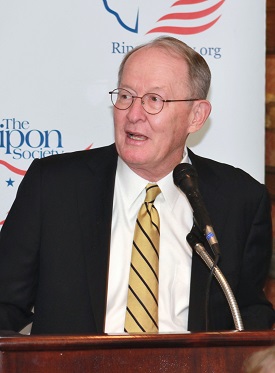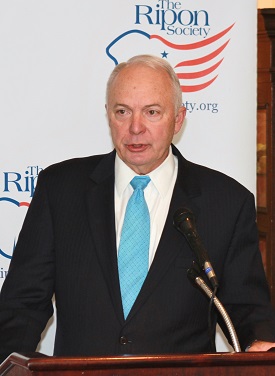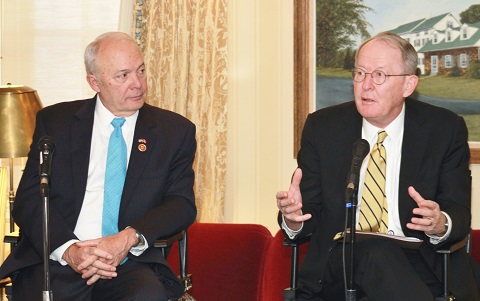Senator Alexander and Chairman Kline discuss the need for education reform and the effort they are leading on Capitol Hill to achieve that goal

WASHINGTON, D.C. – The Ripon Society held a breakfast discussion this past Thursday morning with two men who are leading the effort to strengthen and reform the educational system in the United States.
The leaders were Representative John Kline (MN-2), who serves as Chairman of the Education and the Workforce Committee, and Senator Lamar Alexander (TN), who is the Ranking Member on the Health, Education, Labor and Pensions Committee and who opened the discussion by talking about the importance of education reform and its impact on economic growth.
“While education has many purposes,” the Tennessee lawmaker stated, “the larger picture is that better schools mean better jobs. Our goal as a party should be to double the size of our economy — so more people can share in the wealth, so we can improve the size of the middle class, and so we can improve the standard of living in a more competitive world. When I became Governor, Tennessee was the third poorest state. I knew that the government couldn’t raise family income, because the government didn’t have enough money to do that. So I had to create an environment in which that could happen…”
“We embarked on an effort which has now been going on for 30 years. The latest test scores were released last week and our state is making more rapid progress than any other state in the country, which is a credit to the teachers of Tennessee and to the principals, but also to governors and legislators who tried different things.”
As Ranking Member of the Senate Education Committee, Alexander holds a title that does not do justice to his experience in education reform over the years. In addition to his leadership on the issue as Governor of Tennessee from 1979-1987, he also served as the President of the University of Tennessee and taught at Harvard. In 1991, he was selected by President George H.W. Bush to be the nation’s fifth Secretary of Education – a role that gave him first-hand knowledge of the federal education bureaucracy and, he says, what it has become.
“The combination of No Child Left Behind and Race to the Top and the use of waivers has created such congestion on education policy that Washington is, in effect, a national school board,” he stated. “And so, for example, while I think finding fair ways to reward outstanding teaching is absolutely crucial to our success, I’m not in favor of Washington telling Tennessee how to do it. We don’t need somebody up here requiring or defining or setting a few well-intentioned parameters. You know how that goes. We come up with a few good ideas, and then someone in the Education Department will say we need some parameters — which means that we don’t trust those stupid governors and legislators with our children.”

The former university president and college professor also touched on the state of higher education in his remarks, and shared his thoughts on how it could be improved. “Higher education is like the automobile industry in the 1970’s,” he observed. “The industry got a little lazy and a little uncompetitive, and in a rapidly changing world, it nearly came to its knees. I think it’s coming back today. But higher education needs to learn a lesson from that as we create an environment for it to succeed… One of the most important things I think we have to do in higher education is to deregulate it. I’ve suggested we ought to start from scratch with the higher education bill. We’ve reauthorized it eight times, and every time there are these well-meaning laws and well-meaning regulations that are passed. The new bill that we have now will have twice as many regulations. It’s not that they’re bad or ideological. It’s just that nobody takes the time to weed before you plant the next garden.”
Chairman Kline echoed his Senate counterpart’s remarks, and discussedThe Student Success Act (H.R. 5), a reform bill he authored that was passed by the Education and Workforce Committee and approved by the House of Representatives on July 19th. According to Kline, the bill would restore local control, support effective teachers, and empower parents. It would also, he added, help reduce something that both he and Alexander agree have gotten way too big — the federal footprint in America’s education system.
“As Lamar said,” the Minnesota Republican stated, “we have an administration that has decided that they really are the nation’s school board. So we felt it was imperative to get legislation passed that would reduce that federal footprint, restore local control, empower parents and teachers, and put education back where it belongs. I believe that is still an imperative, because the conditional, temporary waivers are still just that — conditional and still temporary. And the states which have them, including my own, are finding out it’s not everything they thought. Teachers are upset. Teachers’ unions are upset. Principals are upset. It needs to be fixed, and we are intent on continuing to push it. And I don’t want it to die in the dark Senate chamber. We need Senator Harkin to work with Senator Alexander to get something going over there.
“We feel like it’s pretty good legislation. We’ve had some differences on the teacher evaluation piece. I think it’s very important, as does Senator Alexander, that there be meaningful teacher evaluations. I thought it was important to put some language in to tell states that they had to do such a thing — not how to do it, but they had to do such a thing. But we had an open process and that was taken out, so neither the bill that passed the House or Senate version has that right now. And I think that Senator Alexander is right that states are being responsible and almost all of them — certainly Tennessee and Minnesota — are going to be responsible. But that will be a factor, because the kids deserve good teachers. There are plenty of them out there and, unfortunately, there are some who are not.”

Kline has served as Chairman of the House Education and the Workforce Committee since January 2011. A member of the panel since his election to Congress in 2003, he has built a reputation as a strong advocate for greater flexibility and local control in education and increased federal funding for special needs and low income students. He has also led the effort to cut federal paperwork requirements for schools, something he touched on, as well.
“We had a hearing last year and one of the witnesses brought a stack of three-ring binders and plunked them down on the witness table,” the Chairman recounted. “Those weren’t the regulations. Those were the indices to the regulations that schools have to go through. So simplifying that would be very helpful. That’s been a theme we’ve pushed regularly on the committee — get rid of duplicative programs, streamline, simplify, make it easier for students and administrators.”
The Ripon Society is a public policy organization that was founded in 1962 and takes its name from the town where the Republican Party was born in 1854 – Ripon, Wisconsin. One of the main goals of The Ripon Society is to promote the ideas and principles that have made America great and contributed to the GOP’s success. These ideas include keeping our nation secure, keeping taxes low and having a federal government that is smaller, smarter and more accountable to the people.



